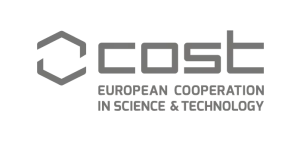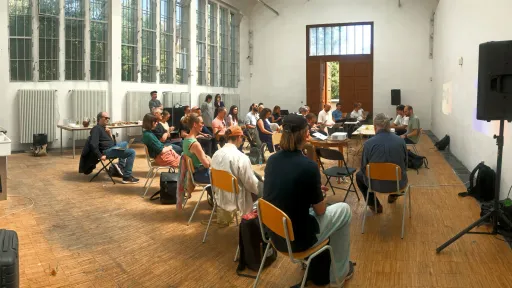Exploring Frameworks for Collective Artistic Intelligence: Highlights from the WG3 June 2025 Meeting at AVU Prague
Prague, Checzia, AVU-Academy of Finer Arts Prague
(Šaloun Studio, AVU-Academy of Finer Arts Prague, Slovenská 4, 101 00 Praha 10)
This working group will develop cornerstones of a common reference framework to effectively connect the different lines and link different approaches and projects in artistic research. By activating Artistic Intelligence, this framework will outline a larger, collective impact of artistic research in relation to artistic practices across the different disciplines and in response to societal challenges of the triple transition.
On June 13–14, 2025, the Šaloun Studio at the Academy of Fine Arts in Prague hosted an intensive two-day working meeting focused on working group participants' experience on current referencing within artistic research (challenges, experiences, opportunities) and the potential for fostering collective artistic intelligence with solutions such as The Research Catalogue (RC). Working Group members gathered to explore how referencing, technology, and collaborative tools can deepen the role of the solutions such as the RC in artistic research.
The first day opened with Casper Schipper presenting new RC developments followed by a lively breakout session tackling challenges and opportunities, with participants sharing experiences and ideas for further developments and RC for Collective Artistic Intelligence.
Later, Paulo Luis Almeida, Chair of the COST Action, outlined the initiative’s goals and structure. Casper Schipper and Daniele Pozzi followed with insights into how the RC serves as both a referencing system and knowledge base in artistic research, followed by a presentation by Andre Guidi and Danielle Pozzi about a workshop given at Rome Fine Arts Academy on KOBI, combining collectively authoring an RC Exposition and AI semantic mapping. Jonas Hovden Sjøvaag then showcased a use of automatic data (in the form of a spreadsheet) to RC exposition conversion.
The day concluded with group discussions on referencing through close-reading of expositions, spotlighting strategies using RC material.
Day two centered on the exploration of existing frameworks, practitioner experiences, and challenges, with a particular focus on referencing practices. Participants shared experiences around referencing in artistic research, addressing discoverability and the challenges of knowledge transfer across projects and disciplines. WG3 also discussed how to organise their online collaboration (which will pilot the actions NextCloud environment).
Sinem Aslan presented "Using Computational Vision to Interpret Artistic Intent", to detect differences between a painting and photographic source material. İbrahim Arpaci followed with "Enhancing Referencing in Artistic Research Through AI: A Critical Perspective". Additionally, Anthea Caddy contributed insights from her work organising the Special Interest Group Sound Research, from the perspective of referencing within a very diverse field.
These presentations prompted engaging and extended discussion, resulting in the agenda point "Search, Taxonomies within the RC" (originally planned at 14:00) being postponed to a later meeting - allowing the group to focus instead on these compelling contributions, and discuss what tasks the group want to move forward with as a group. Identifying key areas for future collaborative work.
The meeting wrapped up with a strategy session on the role of AI/ML in artistic referencing, emphasising ethical considerations and the importance of artist agency in shaping how their work is represented in digital systems.
With a strong sense of collaboration and understanding of challenges and potentials in referencing and discoverability within artistic research, the two-day working meeting concluded with a shared commitment to advancing artistic research infrastructures in a thoughtful and inclusive way.
Full schedule:
Friday 13.06.2025
Šaloun Studio, AVU-Academy of Fine Arts Prague
10:00 - 10:30 | Main Aims and Organisation of the COST Action Funded Application Artistic Intelligence / Working Group 3 and the RC Framework presented by COST Chair Paulo Luis Almeida and WG3 Leader Casper Schipper - Plenary (30 minutes).
10:30 - 11:00 | Update on RC Librarians’ Working Group on use of DOIs, Exposition Categories (containers) and Meta Data/Keyword Standards presented by Johan A Haarberg - Plenary (30 minutes).
11:00 - 11:40 | RC as Knowledge/Referencing Basis for Artistic Research / Expositions by Statistics / RC for Collective Artistic Intelligence - by Casper Schipper and Daniele Pozzi (40 min).
11:40 - 12:10 | Break
12:10 - 13:00 | Exploring the Individual and Collective Dimension of Artistic Research in Collaborative RC Expositions Using the AI Platform KOBI by Andrea Guidi, Rome Fine Arts Academy and Daniele Pozzi - Plenary (40 minutes).
13:00 Lunch
14:40 - 15:00 | Organizing Unruly Data: Approaching the HTML Exposition Format in the RC presented by Jonas Hovden Sjøvaag, Artistic Research Doctoral Candidate, University of Agder - Plenary (20 minutes)
15:00 - 16:30 Reflections on an Exposition in the Perspective of Research Focus and Referencing (90 minutes).
In the last year’s meetings, we had very constructive group discussions on how close-readings of expositions could be used for teaching purposes. Plenary Intro and Breakout Session on pre-distributed expositions:
• Andreas Berchtold, ‘In circles leading on – folkdance, a choreographic intersection‘ (2022) https://www.researchcatalogue.net/view/1571956/1571957/0/0
• Urška Medved, ‘“THE LAND OF BEES” -the paradoxicality of ABSENCE and the execution of VACATION-‘ (2024) https://www.researchcatalogue.net/view/3294092/3294095/0/0
• Søren Thilo Funder, ‘Oceanic Horror or How to Survive the Night in the Haunted Mansion of Absolute Capitalism‘ (2024) https://www.researchcatalogue.net/view/1955415/1955416/0/0
16:30 - 16:45 | Summing Up
16:45 | Closure
18:00 | The AVU Diploma Show AVU: U Akademie 4, 170 22 Prague 7
Saturday 14.06.2025
Šaloun Studio, AVU-Academy of Fine Arts Prague
10:00 - 10:15 | Introduction (Casper Schipper)
* Brief introductions
* Recap of previous discussions and objectives
10:15 – 10:45 | Review of Practical Tools (Casper Schipper)
I suggest we discuss the WG’s online presence to ease online collaboration and continue work between meetings. I will take us into the actions’ Nextcloud and discuss which elements we might choose for communication. I will also show our current archive of recordings on the Research Catalogue and how we might extend this page collectively.
10:45 - 11:00 | Short Break
11:00 - 12:30 | Existing frameworks, experiences and challenges (Presenting Participants)
Short presentation and discussion on inputs from participants.
Experience in current referencing within artistic research:
- How has prior work influenced your artistic research project?
- How did we discover relevant artistic research online and offline?
- In what ways can results and methodologies be discoverable and transferable to other researchers?
- What specific challenges are there in finding references for artistic research?
- What platforms are relevant (also beyond RC)?
12:30 - 14:00 | Lunch
14:00 - 15:30 | Search, Taxonomies in the Research Catalogue
* Collective reading of examples in the Research Catalogue.
* Navigating the RC by its keywords and abstracts. What can we learn from the RC?
15:30 - 16:30 | Strategy Brainstorm Session (all participants)
* How can ML/AI help encourage referencing within artistic research?
* How do we make sure that the producers of artistic research outcomes can have agency within these systems about how they are represented?
* How do we avoid other common pitfalls and ethical issues that occur with the use of AI/ML?
* Is there artist work that might be relevant here (artists that deal with AI/ML and Artistic intelligence)
16:30 - 17:00 | Closing and next steps

COST (European Cooperation in Science and Technology) is a funding agency for research and innovation networks. Our Actions help connect research initiatives across Europe and enable scientists to grow their ideas by sharing them with their peers. This boosts their research, career and innovation.

This meeting is based upon work from COST Action CA23158, supported by COST (European Cooperation in Science and Technology).

